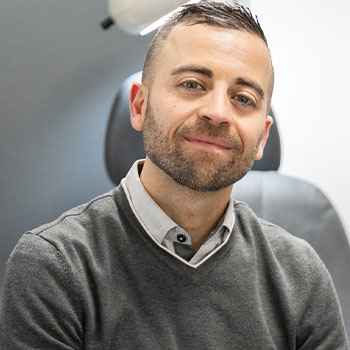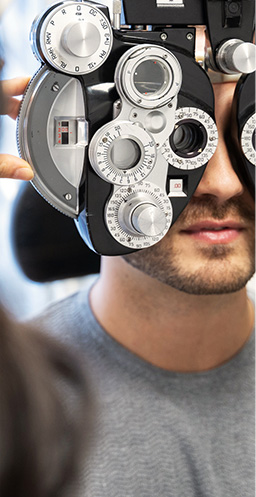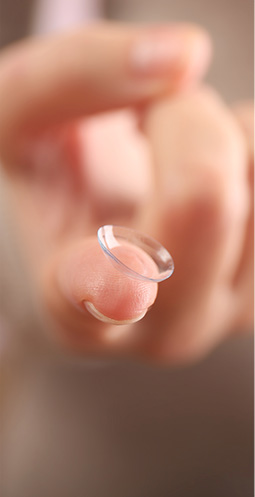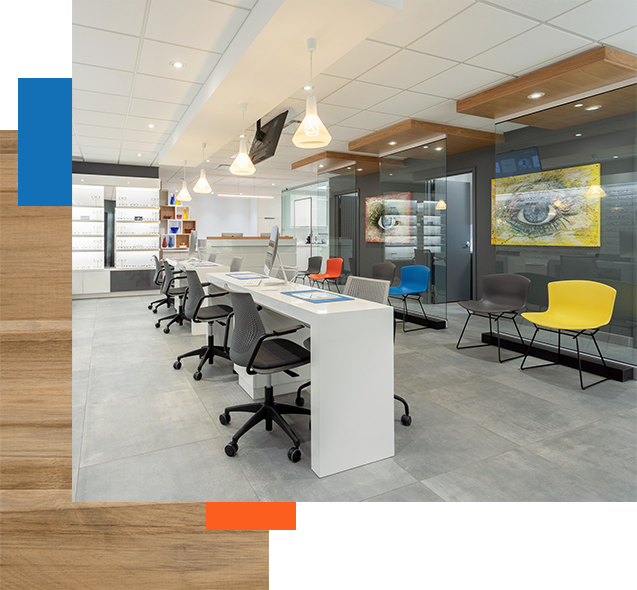If you’re considering laser eye surgery, you probably have some questions about the procedure. From how it works to healing time, it’s important to understand the in’s and out’s of laser eye surgery in order to make an informed decision about your eye health.
Why Get Laser Eye Surgery?
Of course, the main reason to get laser eye surgery is freedom from glasses and contacts. Depending on your visual needs, laser eye surgery may eliminate your need for glasses and contacts or reduce how often you need to wear them.
Not all patients end up with 20/20 vision from laser eye surgery, but many get clearer vision, meaning glasses and contacts are only needed for visually-demanding or detail-oriented tasks.
Since the surgery was introduced in 1995, patient outcomes for laser eye surgery have improved greatly. Advancements in the procedure like the introduction of LASIK and wavefront-guided lasers have resulted in better vision and reduced healing times. While it’s important to understand the limitations of laser eye surgery, it is now more advanced than ever.
Who Shouldn’t Get Laser Eye Surgery?
Advancements in laser eye surgery have opened up the procedure to more patients, but it is not recommended for everyone. For the most part, laser eye surgery is not recommended if you fit into the following categories:
- Under 18 years old
- Have severe farsightedness or astigmatism
- Your prescription has not stabilized or is still changing (lens prescription must be consistent for 1 year before surgery)
- Have thin corneas
- Have irregularly shaped corneas, or conditions like keratoconus
- Have an eye injury or eye infection
- Have certain eye conditions (including amblyopia/lazy eyes or strabismus/crossed eyes)
- Are pregnant or nursing
However, there are laser eye surgery solutions for certain cases. PRK may be an option for patients with thin corneas, for example.
The best way to find out if you’re a good candidate for laser eye surgery is through a laser eye surgery consultation.
What is Laser Eye Surgery?
Consultation
A laser eye surgery consultation is the first step in the laser eye surgery process. The consultation is performed by your optometrist, who will help determine your candidacy for laser eye surgery.
First, your optometrist will perform a detailed comprehensive eye exam. The exam helps rule out any eye conditions which would rule you out as a good candidate for laser eye surgery. Your optometrist will also update your prescription so you have the most up-to-date information for your procedure.
Your optometrist will put special drops in your eyes to dilate them and will recheck the prescription. After the drops have taken their effect, your optometrist will assess your retina in detail. This allows for a more detailed health assessment of the eyes as well as a measurement of the prescription with the eye muscles in their relaxed state. The procedure is called cycloplegic refraction and is often done on a separate visit, but it will need to be done before you are referred to a laser centre for surgery.
From there, your optometrist will discuss the surgery with you. You should understand the risks, complications, and healing time before you decide to proceed with laser eye surgery. Once you have a good understanding of the procedure and asked any questions you might have, your optometrist will refer you to a reputable laser clinic.
Surgery
The surgery will vary depending on which laser surgery option is recommended for you. Most surgeries take 10 to 15 minutes per eye, with the laser only taking 20 to 50 seconds to correct your vision. Expect to be at the surgery centre for a total of an hour and a half from start to finish.
Once the surgery is complete, it is recommended that a friend or family member drive you home. Your vision should be much clearer right after the procedure but will slowly improve in sharpness over the coming days and weeks. In some instances, minimal halos around lights may be noticed shortly after the procedure but these will subside with time as the mild inflammation from the surgery heals.
Post-Operative Care
Post-operative care will be done by your optometrist to ensure your eyes are healing properly. Often, post-operative care is built into the cost of your surgery. Your exact post-operative care will depend on your surgery type and your needs.
Some procedures, like PRK, require daily monitoring for about a week until the epithelium heals. Expect regular follow-up appointments to monitor your healing for at least 6 months after surgery. Your surgeon and optometrist will work together to determine your post-operative care schedule.
Different Types of Laser Eye Surgery
The 2 most common types of laser eye surgery in Canada are LASIK and PRK. That said, there are other laser eye surgery options that may work for you, depending on your visual needs.
LASIK
Laser-assisted in situ keratomileusis, more commonly known as LASIK, is the most commonly recommended type of laser eye surgery. It’s the most frequently performed elective surgery in North America and can be used to correct myopia (nearsightedness), hyperopia (farsightedness), and astigmatism.
There are variations of the surgery, including custom or wavefront-guided LASIK, where detailed topographical data of your eye is used to guide the laser during surgery. Bladeless LASIK is another variant, where a laser is used to create the corneal flap. Overall, the process of the surgery is relatively similar across the various LASIK procedures.
During the surgery, your surgeon will first numb your eye with anesthetic eye drops. Then, a flap is created and peeled back to access the corneal stroma. A laser is used to reshape the cornea to correct your refractive error. Finally, the flap is placed in its natural position and protective glasses are given to you to wear for the first few days to act as a shield to protect your corneas.
You may feel mild discomfort following surgery, but this will subside after a few hours. In the vast majority of cases, you will see quite clearly right away with minor improvements in the quality of the vision taking place over the first few weeks. Your sharpest vision will usually be attained within the first 1-3 months. Potential side effects like dry eye, halos, and glare usually subside within this time as your eye heals.
PRK
PRK, or photorefractive keratectomy, was the first type of laser surgery introduced and was the most common, prior to the introduction of LASIK. Today it is the second most common laser surgery procedure and is typically recommended if LASIK is not a good option.
The main difference between LASIK and PRK is that no corneal flap is made in PRK surgery. Because there is no corneal flap, PRK can be a better option than LASIK for patients with thin corneas or with active lifestyles.
During PRK, the epithelium (protective outermost surface of the eye) is removed. Once the cornea is exposed, it is reshaped with a laser to correct your refractive error. A protective, temporary contact lens is placed on your eye for the first few days while it heals. Your optometrist will remove this contact lens once the top layer of the cornea, the epithelium is fully healed.
The recovery time is longer than LASIK as the epithelium grows back, but because there is no flap, there is no risk of flap-related complications. Expect mild discomfort for 4 to 5 days following surgery, but you should be able to do activities like driving after about a week.
LASEK
LASEK is a variation of PRK where the epithelium is removed with an alcohol solution and the cornea is reshaped with a laser. It is a relatively new procedure and has not been approved by the FDA in the United States. In Canada, many surgeons are waiting for more concrete data before practicing the procedure.
Given the unknowns surrounding the procedure, LASEK is not recommended and is not practiced by many major laser surgery clinics.
ICL
An ICL, or implantable contact lens, may be an option for patients who can’t have LASIK or PRK, such as patients with severe myopia, hyperopia or astigmatism. If the amount of vision correction you need can’t be done with a laser, ICL may be an option.
ICL is not a true laser surgery as it does not change the shape of your eye with a laser. Instead, an implantable lens is inserted into the eye to help correct your vision. Unlike other lens implant surgeries, your natural lens is not removed during ICL. Instead, a supplementary lens is implanted in front of your natural lens to neutralize your prescription and improve your vision.
RLE
Refractive lens exchange, or RLE, is another option for patients who are not eligible for LASIK or PRK. It can be used to treat astigmatism, moderate to severe hyperopia, myopia, and presbyopia.
During the surgery, your natural lens is removed, similar to cataract surgery. Then, an artificial lens is inserted to correct your refractive error, reducing your need for corrective lenses. Similar to other laser surgery options, initial recovery takes about a week and you may experience issues like blurry vision, halos, and glare which are temporary.
Refractive Procedures for Presbyopia
Presbyopia is when the natural lens in the eye loses its elasticity and is no longer able to efficiently focus for near objects. Presbyopic patients usually require reading glasses or multifocal lenses if they also have a distance prescription. This usually occurs in patients over the age of 40.
The two most popular refractive procedures for presbyopic patients include monovision laser vision correction and refractive lens exchange with a multifocal implant.
Monovision laser vision correction is when the dominant eye is corrected for distance vision and the non-dominant eye is corrected for near vision. The surgeon is able to determine the optimal correction power for both eyes so that there is a seamless transition at all distances. In some cases, depth perception may be slightly affected with monovision. If a patient has been wearing monovision contact lenses, then this procedure is a good option and often tolerated very well by patients. Monovision laser vision correction can be done by either LASIK or PRK.
Refractive lens exchange with a multifocal lens is simply an RLE procedure but a bifocal or trifocal implant is used instead of a single vision implant. The multifocal lens implant will allow you to see clearly at all distances through both eyes.
Based on lifestyle and visual needs, the surgeon is able to determine which procedure is more suitable for each patient.
Ready for Laser Eye Surgery?
Free yourself from glasses and contacts and wake up with clear vision. Stoney Creek Eye Care is your laser eye surgery partner, and we’ll be with you every step of the way to make sure your eyes are getting the best care possible.
You will be given unbiased advice and we can refer you to the most reputable laser vision centres in the area. If you’re ready to learn more about your laser eye surgery options, contact us for a laser eye surgery consultation.









